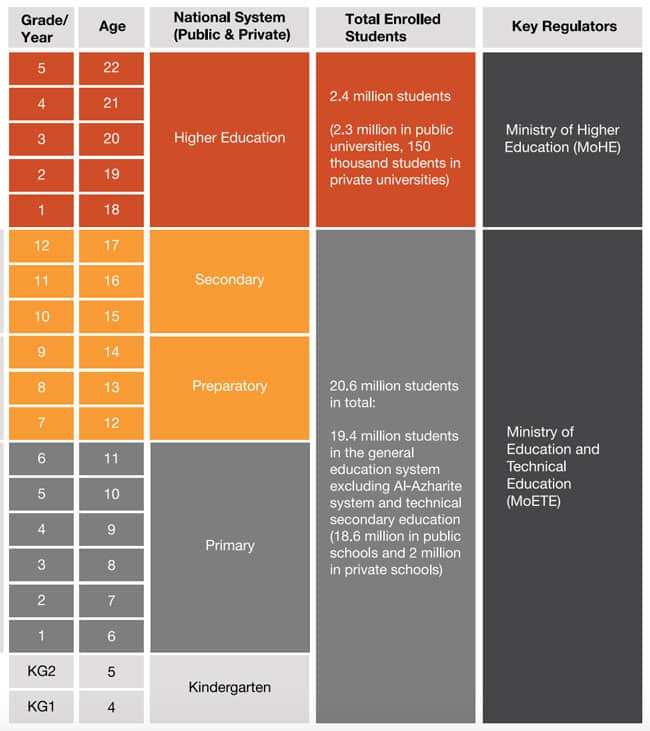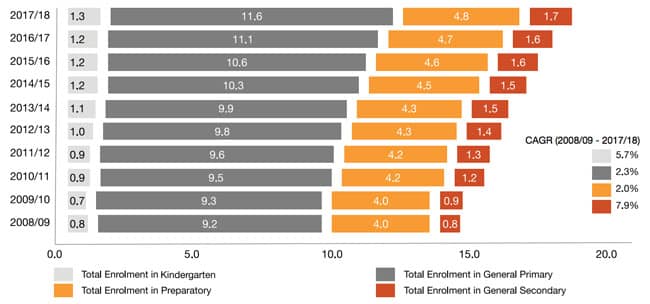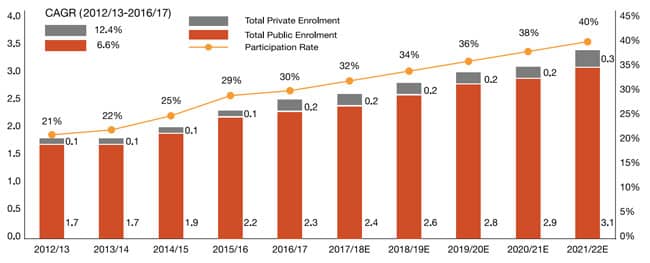Growing Egyptian demand for education pressures domestic capacity
Egypt is the most populous country in the Arab world. The population more than tripled – from 32 to 98 million – between the mid-1960s and 2017, and slightly more than half of Egyptians are under the age of 25.
Add to this that the substantial economic reforms currently underway in Egypt are now helping to stabilise the economy. Economic growth surpassed 5% in 2018, and inflation, while still high, has cooled considerably over the last two years.
This improved performance has been driven by public investments, expanding consumer consumption, and rising export values. Supported (even required in some cases) by major international funders such as the World Bank, Egypt is also making targeted investments in health and education to help alleviate poverty and promote social development.
These macro social and economic trends have combined to set the stage for expanded participation at all levels of education.
Egypt relies on a highly subsidised public education system, which, as of the constitutional reforms of 2014, is compulsory for Egyptian students until the end of secondary school. Roughly 90% of Egypt’s K-12 students, and 94% of higher education participants, are educated at public institutions and schools.
As of 2018, there were nearly 21 million students enrolled in K-12 schools, and another 2.4 million in higher education. The following illustration provides an overview of the system, with key oversight bodies noted as well.



Poised for outbound growth
UNESCO reports that the number of Egyptian students going abroad for higher education has tripled in the last decade, from 12,300 in 2008 to nearly 32,000 as of 2017. Those numbers give us an important indicator of how Egyptian enrolment is trending and how it is distributed across destinations. Some of the destination numbers, however, appear to be understated. If we supplement the UNESCO values with destination-supplied data, it appears that the actual number of Egyptian students abroad is higher still, likely on the order of 35,000 (or more) students abroad in 2017/18. This places Egypt among the top sending markets in the Arab World, after Saudi Arabia, Morocco, and Syria. Reflecting strong academic, immigration, and commercial ties within the region, roughly a third of Egypt’s outbound students choose to study in Saudi Arabia or the UAE. The US remains the third most-popular destination and hosted just under 3,600 Egyptian students as of March 2019. While enrolment has been relatively flat in the US, Egyptian numbers have jumped upward in other destinations, notably in Canada, which hosted more than 2,500 Egyptian students in 2018 (an overall increase of 78% over the past five years). Other top destinations include France, the UK, and Malaysia, each with roughly 2,000 Egyptian students in 2017/18. As a recent report from World Education News + Reviews points out, “Aside from the thriving educational exchange with both the UK and Malaysia, student flows to European countries are likely stimulated by access to scholarship funding. More than 1,000 Egyptian students have benefited from European Erasmus scholarships as of 2017, in addition to other funding opportunities.” For additional background, please see:















